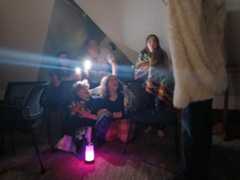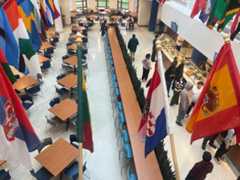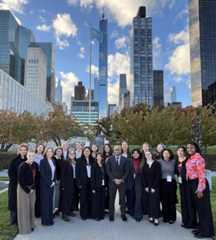LSC highlights solidarity in labor education workshops
In the wake of the certification of Macalester Undergraduate Workers Union-United Auto Workers (MUWU-UAW) in a landslide election earlier this year, most student workers on campus found themselves with union jobs. Macalester’s staff unionized soon after, forming the Macalester Association of Professional Employees (MAPE). In this new campus landscape, the Lealtad-Suzuki Center for Social Justice (LSC) opened this semester’s critical dialogue series with a session focused on unions, followed by a three-part series of labor education workshops.
“[The LSC] developed this workshop series in response to conversations with students who identified labor issues as an important topic for our community to discuss,” LSC Director Hana Dinku said.
Dinku went on to cite “unionizing efforts from Macalester students and staff last year” as a key reason that these issues “felt like a necessary and timely topic” for the LSC to explore.
“Labor education is social justice education,” Dinku said. “This work is deeply tied to the LSC’s mission. The core of labor issues is about the power of people and communities to organize and protect themselves against exploitation. I think this series embodies the LSC’s commitment to praxis — the integration of theory and action.”
The series is in collaboration with the University of Minnesota’s (UMN) labor education service office and began on Oct. 9 with “Unions 101.” It continued with “Understanding Contracts & Negotiation Process” last Thursday and will finish with a history of unions later in November. The LSC brought Amy Livingston, director of labor education service at UMN’s Center for Human Resources and Labor Studies, as a community partner to facilitate the workshops.
“Doing this kind of one-on-one, basic introductory work on what unions are and what they do is critically important for higher-ed audiences who may never have held unionized jobs and may only have sort of a vague idea, or even a stereotypical idea, of what unions do and how they function,” Livingston said.
This separation contributes to the tendency among employees doing what Livingston describes as “mission driven” work to identify “as a part of that mission, instead of understanding themselves as workers.”
“It’s also really important for people to understand themselves as workers in a workplace,” Livingston said.
For Livingston, conceiving work and building relationships with that understanding is a requirement for worker solidarity and the empowerment of labor in every workplace. Livingston includes higher education in that.
Livingston hopes that attendees will leave these workshops with at least these two key takeaways: unions are fundamentally democratic institutions, and that the struggle for “dignity and fairness” at work is an ongoing struggle with “very deep roots in U.S. labor history.”
On the first point, Livingston pointed to a common phenomenon where workers may feel left out of the unionization process, especially after certification elections.
“People can feel like the union is something other than its members — like a third party, and unions are intended to be really nothing more than their members. Their members, in the aggregate, [are] working toward…common collective goals,” Livingston said.
Especially at Macalester, where both new unions now bear responsibility for shaping the precedent of collective bargaining at the college and working conditions for years to come, Livingston encourages people to engage with MAPE and MUWU-UAW. Moving on to US labor history, Livingston broadened her scope.
Over the course of US history, workers have made huge strides towards “making workplaces more fair, more inclusive and less exploitative,” Livingston said.
But, Livingston emphasized that the history of labor in the U.S. is marked by hundreds of years of racialized enslavement and exploitation.
Livingston believes that the future remains a long and difficult struggle against anti-worker forces.
“The economic power that workers are able to build through unionizing their workplaces, for example, is always going to be limited if people are facing other forms of oppression and exploitation in society,” they said.
Despite that, Livingston does see a better future taking shape in the dual direction of the labor movement today as it continues the struggle for better conditions in the workplace “but also uses the power that we’re able to build through workplace organizing to address other social harms and social injustices.”
Similarly, Dinku views unions as particularly essential at this moment for many of the same reasons as Livingston.
“I would continue to encourage everyone to engage with labor education in whatever capacity they can,” Dinku said. “I believe there is a war on poor people in this country. Our current moment is a reminder that the only way we can resist and protect ourselves and our communities is by organizing and standing in solidarity with one another. We still have one labor education workshop left this semester – a deep dive into the history of labor. I hope people will join us!”

Megan Worry ’28 (they/them) is from the Bay Area in California and has had a passion for photography for many years. They are one of the 2 Associate Photo Editors and is majoring in biology. If you get them talking about anything bio, like ferns or genetics/epigenetics, they will go forever :) They are hyped for all the mac weekly tjs snacks!























